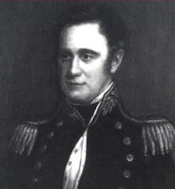he went to obey an order." Commander Johnston had the man "stripped, lashed up to the hammock rail and down to the grating, and flogged with twelve lashes on his bare back, and without allowing the man one word in explanation or defense." When the man alleged that he was "flogged unjustly," Johnston had him "confined in double-irons." Stanly believed the man, not under military law, had been "tyrannically oppressed."16
After his "toothache" court-martial and subsequent court-martial for missing the return boat, Stanly filed a grievance with the secretary of the Navy. This, along with the grievances filed by Lts. Craven, Marchand, and Green, apparently caught the secretary's attention.
Navy Secretary William Graham was from North Carolina, as was Stanly and Stanly's brother Edward, then a sitting congressman.17 Stanly's father, John, had also served in the House of Representatives. Jones was ordered to vacate his command and return to Washington, DC. Upon his return, he was court-martialed and charged with fraud against the U.S. for using government funds to purchase gold; attempted fraud by finagling accounting to disguise the use of the funds; and scandalous conduct for "falsely, scandalously, and maliciously" accusing that Lts. Green, Marchand, and Craven had been "tainted by the maddening effect of gold mania" and thereby staining their records and "insulting their professional honor."18 Additionally, he was charged with neglect of duty and, lastly, oppression against Stanly.
The verdict was a mixed bag but did cite that Jones had conducted himself with "scandalous conduct" against Green, Marchand, and Craven. He was also convicted of "oppressing Lieutenant Stanley."19 The military court suspended him from further naval service for five years -- "the first two
Shortly before this incident, Jones himself had gone to the gold fields and purchased 1,808 troy ounces of gold, which could be purchased cheaply because of its abundance in California. The gold was purchased in large part using government funds, with some contributions from Jones and willing ship officers. The gold was then transported back to the East Coast and sold at a profit. Jones then replaced the government funds; he made a profit of $8,000. No profit was paid to the government for the use of its funds.15 Stanly alleged publicly that the scheme was a gross impropriety, again bringing the wrath of the commodore upon him.
In an effort to curb desertions to the gold fields, Jones had escalated the use of military discipline. Stanly described one incident that he found offensive, in which a merchant seaman (not a Navy sailor) impressed aboard the St. Mary's "grumbled as
to be paid.9 The unusual arrangement provided that Dobson's seaman's pay went to Jones, who could "pocket any funds not expended on him [Dobson]."10 During the voyage, Jones, who was financially strapped and under pressure from antislavery elements within the squadron, offered to sell Dobson. Jones sold Dobson for $400 to several "crewmen and high-ranking officers of antislavery sentiment" who pooled their funds.
They, in turn, freed Dobson, who proceeded "to the [California] gold fields to seek his fortune ... and raise money to buy the freedom of his wife and [five] children," all of whom were then enslaved at Jones' Virginia plantation.11 Three years later, Dobson was able to purchase their freedom for $1,200.12
According to Stanly, then serving on the commodore's flagship Ohio, he expressed his "opinion of the impropriety of such conduct." The criticism incurred the wrath of Jones, who immediately ordered him to serve on the Warren. An incensed Jones told Stanly that the Warren would be his "prison ship." Furthermore, "from that time he [Jones] set his panders to work to find causes of accusation against me," Stanley claimed.13
Another incident that enraged Stanly involved three other junior officers -- Lts. Craven, Marchand, and Green -- who had sought permission to go-ashore and travel to the California gold fields. Jones issued an order forbidding any watch officer from leaving the ship. He then wrote a letter to the Secretary of the Navy suggesting the trio were "tainted by gold fever."
Somehow the letter became public and was published in an East Coast newspaper. The three officers were enraged, alleging that the order infringed on their honor and that Jones' letter had publicly maligned their reputation and honor. The trio filed a formal complaint against Jones.14
Continued Page 3
The commodore, the toothache court-martial, and Moby Dick
Continued from Page 1



Commodore Thomas ap Catesby Jones
Page 2 References 1 thru 28 see pages 3 and 4
E-MAIL ME ddemers901@sonic.net
